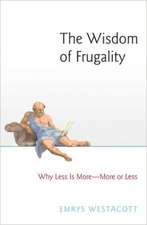The Ethics of Legal Coercion: Philosophical Studies Series, cartea 26
Autor J.D. Hodsonen Limba Engleză Paperback – 31 dec 1984
Din seria Philosophical Studies Series
-
 Preț: 407.78 lei
Preț: 407.78 lei - 15%
 Preț: 644.95 lei
Preț: 644.95 lei - 18%
 Preț: 1120.18 lei
Preț: 1120.18 lei - 18%
 Preț: 1005.43 lei
Preț: 1005.43 lei - 15%
 Preț: 640.06 lei
Preț: 640.06 lei -
 Preț: 381.21 lei
Preț: 381.21 lei -
 Preț: 391.61 lei
Preț: 391.61 lei - 15%
 Preț: 640.88 lei
Preț: 640.88 lei - 15%
 Preț: 639.25 lei
Preț: 639.25 lei - 18%
 Preț: 1221.51 lei
Preț: 1221.51 lei - 18%
 Preț: 947.18 lei
Preț: 947.18 lei - 18%
 Preț: 955.56 lei
Preț: 955.56 lei - 18%
 Preț: 950.96 lei
Preț: 950.96 lei - 15%
 Preț: 645.47 lei
Preț: 645.47 lei - 15%
 Preț: 641.38 lei
Preț: 641.38 lei - 15%
 Preț: 644.82 lei
Preț: 644.82 lei - 18%
 Preț: 950.66 lei
Preț: 950.66 lei -
 Preț: 386.00 lei
Preț: 386.00 lei - 15%
 Preț: 644.82 lei
Preț: 644.82 lei - 15%
 Preț: 642.18 lei
Preț: 642.18 lei - 15%
 Preț: 643.48 lei
Preț: 643.48 lei - 18%
 Preț: 944.99 lei
Preț: 944.99 lei - 15%
 Preț: 638.76 lei
Preț: 638.76 lei - 20%
 Preț: 553.25 lei
Preț: 553.25 lei - 20%
 Preț: 560.30 lei
Preț: 560.30 lei - 18%
 Preț: 951.29 lei
Preț: 951.29 lei - 18%
 Preț: 893.40 lei
Preț: 893.40 lei - 20%
 Preț: 566.75 lei
Preț: 566.75 lei - 18%
 Preț: 951.77 lei
Preț: 951.77 lei
Preț: 635.47 lei
Preț vechi: 747.61 lei
-15% Nou
Puncte Express: 953
Preț estimativ în valută:
121.61€ • 125.63$ • 101.21£
121.61€ • 125.63$ • 101.21£
Carte tipărită la comandă
Livrare economică 25 martie-08 aprilie
Preluare comenzi: 021 569.72.76
Specificații
ISBN-13: 9789027718433
ISBN-10: 9027718431
Pagini: 196
Ilustrații: XIV, 177 p.
Dimensiuni: 155 x 235 x 10 mm
Greutate: 0.28 kg
Ediția:Softcover reprint of the original 1st ed. 1983
Editura: SPRINGER NETHERLANDS
Colecția Springer
Seria Philosophical Studies Series
Locul publicării:Dordrecht, Netherlands
ISBN-10: 9027718431
Pagini: 196
Ilustrații: XIV, 177 p.
Dimensiuni: 155 x 235 x 10 mm
Greutate: 0.28 kg
Ediția:Softcover reprint of the original 1st ed. 1983
Editura: SPRINGER NETHERLANDS
Colecția Springer
Seria Philosophical Studies Series
Locul publicării:Dordrecht, Netherlands
Public țintă
ResearchCuprins
One: The Ethics of Respect for Persons.- 1.1. Introduction.- 1.2. Empirical Choice.- 1.3. Rational Choice.- 1.4. Rational Empirical Choice.- 1.5. Considered Choice.- 1.6. Unencumbered Choice.- Two: The Nature of a Limits Thesis.- 2.1. Introduction.- 2.2. Defining a Protected Sphere.- 2.3. Enforcing Morality versus Preventing Harm.- 2.4. Positive Morality versus Critical Morality.- 2.5. Which Critical Morality Should be Enforced?.- 2.6. Which Specific Kinds of Conduct Are Immoral?.- 2.7. Procedural Matters and Democracy.- 2.8. Conclusions.- Three: The Harm Principle.- 3.1. Harm and Interests.- 3.2. A Respect-for-Persons Conception of Harm.- Four: Legal Paternalism.- 4.1. The Principle of Paternalism.- 4.2. Paternalism and Law.- Five: The Welfare Principle.- 5.1. Introduction.- 5.2. The Basis of Positive Rights.- 5.3. The Plausibility of Positive Rights.- 5.4. Positive Rights and Individual Action.- 5.5. Positive Rights, the State, and Collective Action.- Six: The Principle of Community.- 6.1. Introduction.- 6.2. Laissez-Faire versus Collective Control.- 6.3. The Scope of Collective Control.- Seven: The Principle of Necessary Means.- 7.1. Introduction.- 7.2. The Principle of Necessary Means.- 7.3. Some Uses of the Principle.- Eight: Exclusionary Principles.- 8.1. Introduction.- 8.2. The Principle of Free Speech.- 8.3. The Generalized Exclusionary Principle.- Nine: Punishment.- 9.1. Introduction.- 9.2. Punishment and Respect for Persons.- 9.3. General Justifying Aim.- 9.4. Distribution.- 9.5. Severity.- Ten: Evaluating Legislation.- 10.1. The Principles of Legal Coercion.- 10.2. Taxation and the Provision of Public Goods.- 10.3. Victimless Crimes and the Enforcement of Popular Morality: Pornography.- 10.4. The Problem of Offensive Conduct.- 10.5. Concluding Remarks.- Notes.- Selected Bibliography.- Index of Names.- Index of Subjects.

















